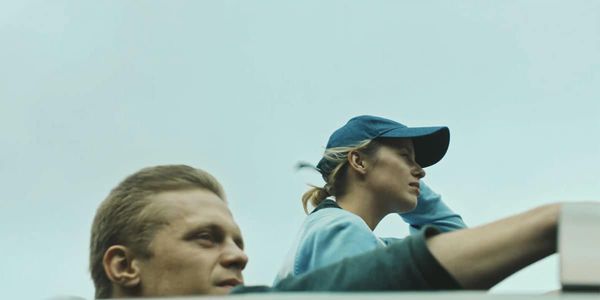Eye For Film >> Movies >> Summer Survivors (2018) Film Review
Summer Survivors
Reviewed by: Jennie Kermode

If you want to break down barriers between people, few things are more effective than cooping them up in a car together for several hours (or long, when the journey goes awry). Of course, they may hate each other by the end of it, but they'll have a better idea of one another's characters and boundaries. Cinema has been using this device for years. Marija Kavtaradze's feature début observes somebody else using it.
Indre (Indre Patkauskaite) has recently qualified in psychology and wants to do data work at a local hospital, but her supervisor, who has clearly noticed her awkwardness around the patients, is having none of it. Though he doesn't make it explicit, it's plain that he doesn't think she should be studying mentally ill people until she fully recognises them as human beings. So he orders her to drive manic depressive Paulius (Paulius Markevicius) and suicidal Juste (Gelmine Glemzaite) up to Palanga at the other side of the country. She's resentful (after the first 30 minutes spent with Paulius in manic mood, viewers may feel similarly) but she can't refuse.

What follows is a low key road trip in which we're invited to get to know the different characters ourselves and to laugh at Indre's stiffness until she finally learns to let go a little. The difficulty is that if one doesn't already have some familiarity with such situations, one is likely to miss a lot of what's going on; and if one does, it's difficult to laugh at something that's so grim a part of everyday life. To engage, therefore, the viewer also has to make a conscious effort and exercise patience. This may represent an interesting artistic exercise but it's not the most appeal way to spend 91 minutes.
Like many directors before her, Kavtaradze uses odd camera angles, visual distancing and a hyper-intense focus on body language to depict her mentally ill characters. This helps to cover Indre's perspective and gradually melts away as she gets to know them better, but it also has the effect of othering them more generally - problematic given that she's simultaneously trying to normalise them in the eyes of the viewer. Markevicius and Glemzaite, meanwhile, both convince in communicating their illnesses partly because they do so only when relevant (as Paulius' mania subsides, for instance, he comes to seem quite unremarkable) and focus on building up other aspects of their characters. There's just a hint of flirtation between them, which is the most effective aspect of the film when it comes to illustrating the limitations caused by illness. Both are savvy enough to understand that a serious relationship would be difficult because their different issues could interact i ways hazardous to them both.
When the group bumps into an old friend of Paulius' who also flirts with him, we see something of the difficulty of forming relationships (including purely social ones) with mentally healthy people. A casual remark to the effect that she heard he was in the loony bin, which she evidently considers impossible, illustrates the limitations created by prejudice. At least Juste accepts him for ho he is. Because it also stigmatises her profession, this key scene is the first in which Indre understands herself as being on Paulius and Juste's team.
This mixture of sharp observation and inadvertent clumsiness characterises a film whose director has obvious talent but needs experience to better be able to anticipate how her ideas will play out onscreen, It's liable to make for much more interesting work in a few years' time when she has produced more accomplished work on which it can shed light. In the meantime, it should be commended for its sincere effort to humanise mentally ill people, even if it doesn't always succeed.
Reviewed on: 12 Nov 2018














